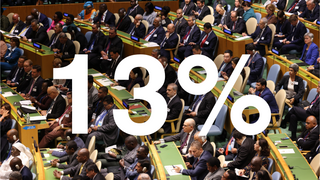As the UN General Assembly meets this week, only 26 of the 193 member states (around 13 per cent) have a female leader. In 2015, the United Nations set a target to achieve gender equality by the end of this decade. At the current pace, it will take another 162 years for world leaders to reach this goal.
While women are vastly underrepresented as heads of state, improvements have been made to the proportion of women making up legislative bodies in the last decade. In 2010, 17 per cent of elected representatives globally were women; in 2023, that stands at around 26 per cent. This is an improvement, but still, only six countries’ national legislatures have gender-equal representation. Australia is close to hitting the mark with 44 per cent of the legislature held by women, while the United States is much further away at only 28 per cent.
Women’s representation in positions of power is essential to address the world’s greatest challenges, with diverse representation proven to enhance bipartisanship and stability, and to promote peace. For the US-Australia relationship, women’s participation and leadership is crucial to keep pace with the burgeoning alliance agenda, while a fully engaged and diverse workforce is necessary to create more innovative and progressive solutions to address the challenges shared by the two countries and their regional partners.
As it stands, only two in 10 Australian and one in 10 US leading international relations think tanks and research institutes are led by women, and a quick number crunch of recent publications in Australia’s major foreign policy blogs shows less than a third feature a woman in the by-line. The Australian Department of Defence has never had a female secretary, nor has the Pentagon been led by a woman in the United States. Recent polling in the United States also shows a third of the population has concerns about women’s ability to lead from the Oval Office, unsurprising considering only one woman has ever been nominated by one of the two major parties to vie for the presidency.
It is for these reasons that the United States Studies Centre has launched its Women in the Alliance initiative. The initiative seeks to improve pathways to women’s more equal representation in the Australian-US bilateral relationship by enhancing the visibility of women’s expertise, creating opportunities for research, networking and cross-border connections, and investing in next-generation women leaders. Expressions of interest are closing shortly to join the inaugural network, click below to find out more.






